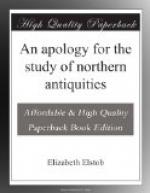[Footnote E:_ Besides the Purpose
for which these Verses are here
cited, it may not be amiss
to observe from some Instances of
Words contain’d in them,
how necessary, at least useful, the
Knowledge of the Saxon
Tongue is, to the right understanding
our Old English Poets,
and other Writers. For example,
#leuest#, this is the same
with the Saxon leofost, most
beloved, or desirable.
#Goddes folke#, not God his Folk,
this has plainly the Remains
of the Saxon Genitive Case.
#Sande#, this is a pure Saxon
word, signifying Mission,
or being sent.
See the Saxon Homily on the Birth Day of
St. Gregory, p. 2.
He [dh]urh his raede & sande us fram [dh]eofles
biggengum aetbraed. He
through his Counsel and Commission rescued
us from the Worship of the
Devil.]
Nor were the French, however more polite they may be thought, than we are said to be, more scrupulous in avoiding them, if these Verses are upon his Monument;
#En toy qui es fitz de Dieu le Pere,
Sauue soit, qui gist sours cest pierre.#
This will be said to be old French, let us see whether Boileau will help us out, who has not long since writ the Art of Poetry;
Mais moi, grace au Destin, qui
n’ai ni feu ne lieu,
Je me loge ou je puis, & comme il plaist a Dieu.
Sat. vi.
And in that which follows,
Et tel, en vous lisant, admire
chaque traite,
Qui dans le fond de l’ame, & vous craint
& vous hait.
Let Lydgate, Chaucer’s Scholar also be brought in for a Voucher;
#For Chaucer that my Master
was and knew
What did belong to writing Verse and Prose,
Ne’er stumbled at small faults, nor yet
did view
With scornful Eye the Works and Books of those
That in his time did write, nor yet would taunt
At any Man, to fear him or to daunt.#
Tho’ the Verse is somewhat antiquated, yet the Example ought not to be despised by our modern Criticks, especially those who have any Respect for Chaucer.
I might give more Instances out of John Harding, and our good old Citizen, Alderman Fabian, besides many others: but out of that Respect to the nice Genij of our Time, which they seldom allow to others, I will hasten to the Times of greater Politeness, and desire that room may be made, and attention given to a Person of no less Wit than Honour, the Earl of Surrey, who at least had all the Elegancy of a gentle Muse, that may deserve the Praises of our Sex,
Her Praise I tune whose Tongue
doth tune the Spheres,
And gets new Muses in her
Hearers Ears.
Stars fall to fetch fresh
Light from her rich Eyes,
Her bright Brow drives the
Sun to Clouds beneath.
Again,




